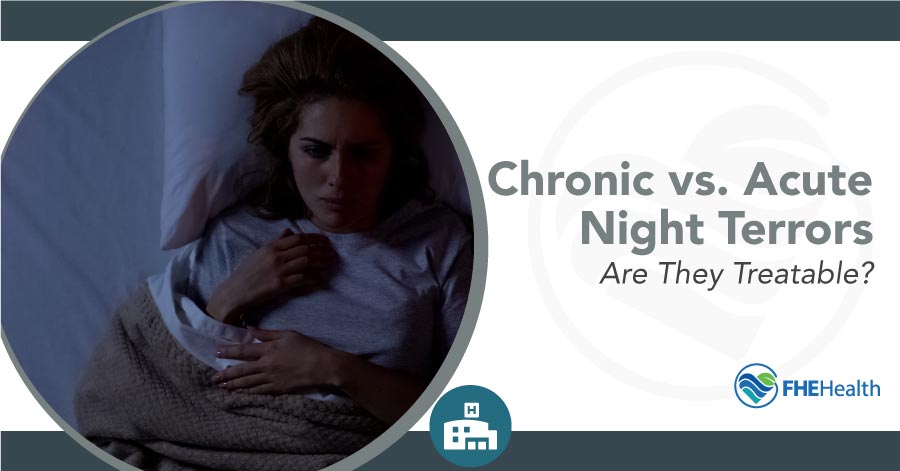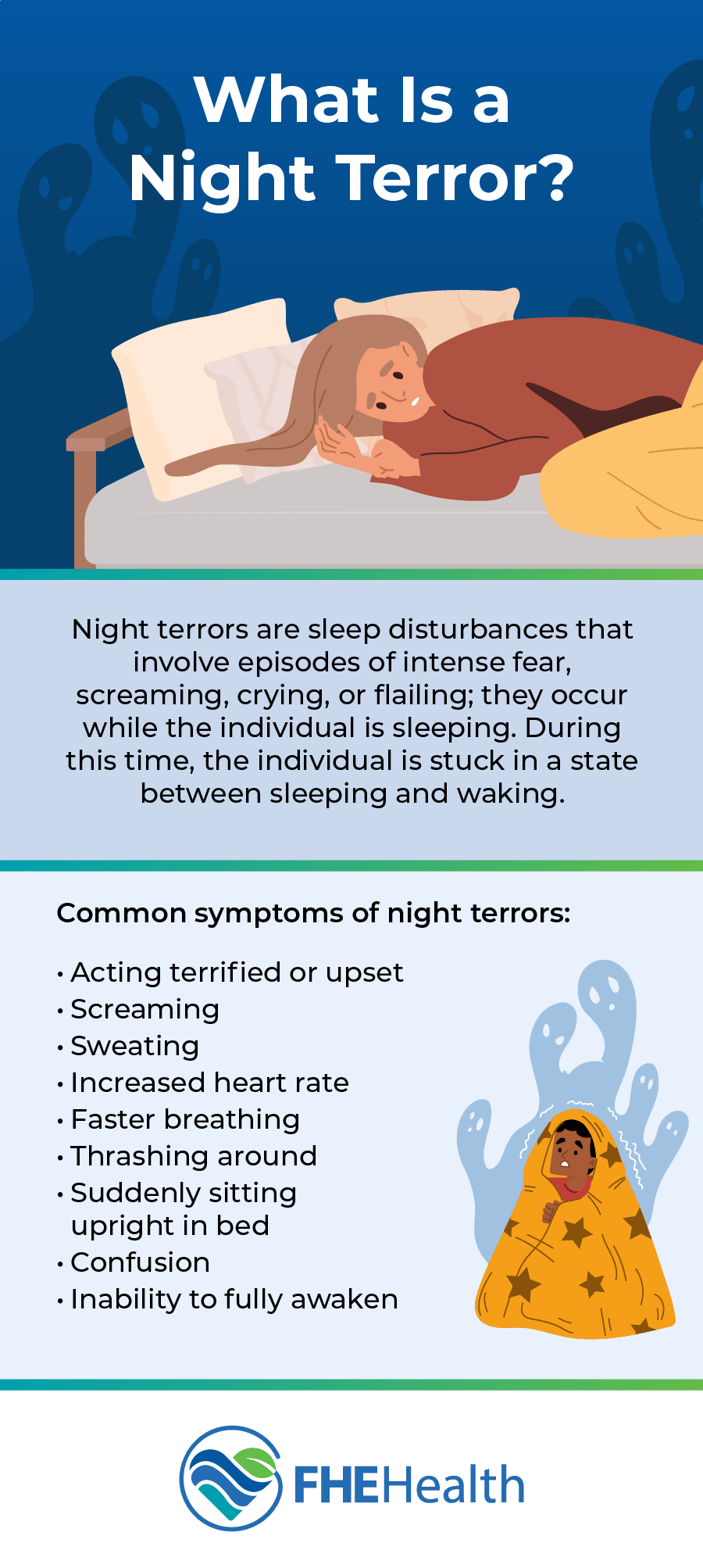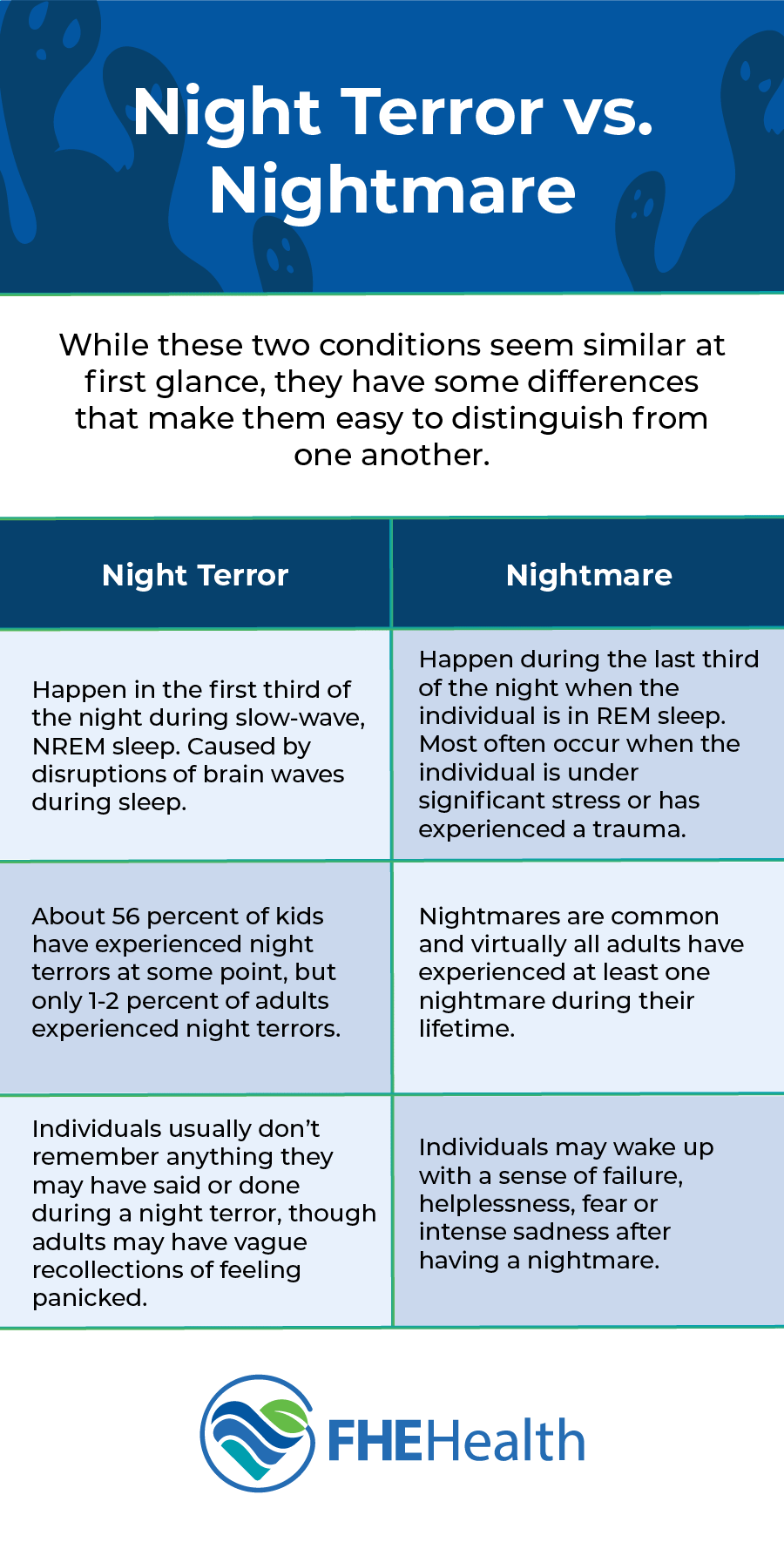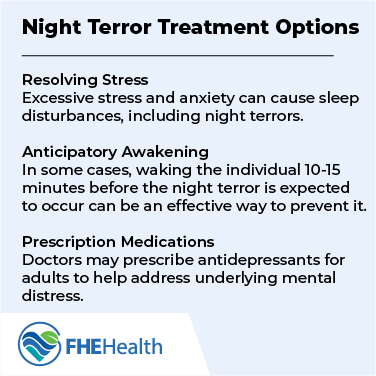
Waking up to a partner or child screaming and finding them thrashing under the covers can be very alarming. It’s upsetting to see a loved one in distress, especially when there doesn’t appear to be a clear cause or simple solution. While these episodes are rarely troubling to the person experiencing them firsthand, they can cause a lot of stress for others in the household.
What Is a Night Terror?
 Night terrors, also called sleep terrors, are sleep disturbances that involve episodes of intense fear, screaming, crying, or flailing. They’re considered parasomnia, meaning that they are undesired events that occur while the individual is sleeping. During this time, the individual is stuck in a state between sleeping and waking. They’re awake enough to get out of bed and navigate their home, but they’re not awake enough to respond to someone who’s trying to interact with them.
Night terrors, also called sleep terrors, are sleep disturbances that involve episodes of intense fear, screaming, crying, or flailing. They’re considered parasomnia, meaning that they are undesired events that occur while the individual is sleeping. During this time, the individual is stuck in a state between sleeping and waking. They’re awake enough to get out of bed and navigate their home, but they’re not awake enough to respond to someone who’s trying to interact with them.
Common symptoms of night terrors include:
- Acting terrified or upset
- Screaming
- Sweating
- Increased heart rate
- Faster breathing
- Thrashing around
- Suddenly sitting upright in bed
- Confusion
- Inability to fully awaken
For some people, night terrors go hand-in-hand with sleepwalking. Episodes may last for a few seconds but most commonly last between five and 10 minutes. While night terrors can leave a lasting impression on someone who witnesses a loved one experiencing one, the individual rarely remembers the episode or any accompanying dreams the next day.
According to the National Library of Medicine, night terrors are among the most common sleep disorders in children. In most cases, they resolve by adolescence. However, night terrors may persist into adulthood or even occur for the first time during adulthood for some people.
Most night terrors randomly happen and for most people, are one-time occurrences. Some only experience them when they are ill and have a fever or when they’re sleeping somewhere unfamiliar. In most cases, they’re not a cause for concern. Some medications are linked to a higher risk of experiencing night terrors, as is excessive alcohol or drug use. Night terrors have also been linked to mood disorders such as depression or anxiety, restless leg syndrome, and sleep-disordered breathing. Chronic night terrors occur regularly and, in some cases, have treatable underlying causes.
Night Terror vs. Nightmare: What’s the Difference?
 Like night terrors, nightmares are disturbances that can impact the individual’s ability to achieve restful sleep. These disturbing dreams bring on negative emotions, such as intense fear or anxiety, that may cause the person to wake up distressed. Dreams are generally very vivid and seem real, and they often have an element where the individual’s safety or survival is threatened. Upon waking, the person feels scared, angry, very sad, or anxious. In some cases, the individual may be afraid to fall back asleep for fear that they’ll have the nightmare again.
Like night terrors, nightmares are disturbances that can impact the individual’s ability to achieve restful sleep. These disturbing dreams bring on negative emotions, such as intense fear or anxiety, that may cause the person to wake up distressed. Dreams are generally very vivid and seem real, and they often have an element where the individual’s safety or survival is threatened. Upon waking, the person feels scared, angry, very sad, or anxious. In some cases, the individual may be afraid to fall back asleep for fear that they’ll have the nightmare again.
While these two conditions seem similar at first glance, they have some differences that make them easy to distinguish from one another.
Timing
First of all, nightmares tend to happen during the last third of the night when the individual is in REM sleep. This stage of sleep plays a key role in emotional processing, memory, and dreaming, so it makes sense that this is when the nightmares occur. The individual may mumble, toss and turn, groan, or breathe heavily during a nightmare. However, they wake up on their own or can be woken up relatively easily and are lucid when they awaken. Nightmares may happen at random, but they most often occur when the individual is under significant stress or has experienced trauma. Certain medications, such as blood pressure medications and sleep aids, can also increase a person’s likelihood of experiencing a nightmare.
Night terrors, on the other hand, usually happen in the first third of the night during slow-wave, NREM sleep. Rather than external factors such as stress or trauma, they’re caused by disruptions of brain waves during sleep. The individual typically displays extreme behaviors such as thrashing, screaming, or running away from the bed. They don’t typically wake on their own and are very difficult to wake up, and they’re confused for several minutes after waking.
Frequency
Second, night terrors are far more unusual than nightmares. Virtually all adults have experienced at least one nightmare during their lifetime, with about 40 percent of adults reporting experiencing them at least monthly. They can occur at any point in adulthood but tend to become more common with advanced age. Among children, about 75 percent have had at least one nightmare. They begin around age 3, typically peak between ages 6-10, and then taper off. By contrast, about 56 percent of kids have experienced night terrors at some point, but only 1-2 percent of adults have had night terrors at some point in adulthood.
Content
Third, nightmares tend to stick with those who experience them. Individuals may wake up with a sense of failure, helplessness, fear, or intense sadness. Night terrors are generally more distressing for those who witness them than for the people experiencing them. Adults may have vague recollections of feeling panicked, but they don’t remember anything they may have said or done. Children seldom remember the experience to any degree.
Night Terror Treatment Options
 While the occasional night terror is likely nothing to worry about, this sleep disturbance can cause some complications for those who experience it regularly. The individual may be sleepy during the day, which may affect their performance at school or work. They may also experience some embarrassment over the problem, which can affect their relationships with household members. In rare cases, night terrors can result in injuries, either to the person experiencing them or those who attempt to intervene.
While the occasional night terror is likely nothing to worry about, this sleep disturbance can cause some complications for those who experience it regularly. The individual may be sleepy during the day, which may affect their performance at school or work. They may also experience some embarrassment over the problem, which can affect their relationships with household members. In rare cases, night terrors can result in injuries, either to the person experiencing them or those who attempt to intervene.
While it’s understandable to want to know how to stop night terrors in adults and children, for most people, no treatment is necessary. However, if the sleep terrors cause stress, sleep disruptions, and a possibility of injury, treatment may be needed.
There are three main night terror treatment options. A doctor can help determine how to stop night terrors in adults and make recommendations accordingly.
Resolving Stress
In some cases, excessive stress and anxiety can cause sleep disturbances, including night terrors. If this seems to be the case, a doctor may recommend meeting with a mental health care professional. They may use several strategies to address night terrors, including cognitive behavioral therapy or biofeedback.
Anticipatory Awakening
Sleep terrors tend to occur within the first couple hours of the individual going to bed. For those who experience them regularly, every occurrence may take place at about the same time, making them easier to anticipate. In some cases, waking the individual 10-15 minutes before the night terror is expected to occur and keeping them awake for a few minutes can be an effective way to prevent it.
Prescription Medications
Unfortunately, there are no prescription medications that are widely used to treat night terrors. In limited cases, doctors may prescribe antidepressants for adults to help address underlying mental distress.
Do Night Terrors Indicate an Underlying Problem?
Night terrors can happen at random, and most of the time, they’re not a cause for concern. However, there are cases in which they can be a symptom of an underlying problem. Factors that contribute to night terrors include:
- Illness
- Stress
- Genetics
- Migraines
- Drug or alcohol abuse
- Breathing problems while sleeping
- Restless leg syndrome
- Brain damage
In cases where night terrors stem from underlying causes, the sleep disruption may resolve on its own with no further treatment once the underlying issue is addressed.
When to Get Help for Night Terrors
Night terrors can be disruptive for some people, hurting relationships, sleep quality, and work or school performance. When this becomes the case, it’s time to get help from a mental health professional. A licensed mental health professional with experience in handling sleep disorders is a great place to start. To learn how FHE can help those who experience regular night terrors or nightmares, contact us today.






